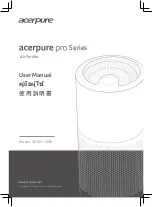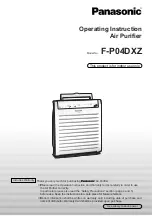
9
PB
INTRODUCTION
Reheat Coil - Augments VRP’s Dehumidification Capability
Temperature differences are not the only source of discomfort in a living space. Humidity also plays a big role — especially in
climates that tend to be both hot and humid. The air conditioning industry’s focus on humidity issues has elevated the importance of
dehumidification. Air conditioning units operate in environments with varying indoor humidity levels. Therefore, the system should
be able to adequately respond to the humidity changes by removing sufficient amounts of moisture in order to keep the conditioned
space within the comfort zone.
Anytime the compressor is running in air conditioning mode, it will also be pulling humidity out of the space. Fixed‑speed
systems shut off after the desired set temperature is reached (i.e. when the sensible load is met). VRP® units run much longer
at lower capacity and energy consumption than traditional systems. Humidity levels are reduced to more comfortable levels. The
dehumidification capability of VRP units is enhanced through the use of a reheat coil that provides superior flexibility in satisfying a
wide range of latent and sensible capacity demands. The reheat coil is placed behind the evaporator coil.
At relatively high ambient temperatures, both sensible and latent components of the system capacity are required to satisfy
increased cooling and dehumidification demands. The VRP wall controller and other sensors in the unit combine to continuously
monitor the space RH levels and when there is demand for extra dehumidification, the refrigerant exiting the condenser is rerouted
to the reheat coil located behind the evaporator on the way to the indoor air stream supplied to the conditioned space.
Thus, cooled and dehumidified air exiting the evaporator coil is reheated to desirable comfort levels for the space.
Summary of Contents for VRP12K
Page 46: ...46 OPERATION Component Identification Indoor Coil 36k ...
Page 48: ...48 OPERATION Component Identification Outdoor Coil Monitored by 1 thermistor ...
Page 49: ...49 OPERATION Component Identification Outdoor Fan BLDC Variable Speed 600 1000 RPM ...
Page 53: ...53 OPERATION Component Identification 4 Way Reversing Valve 208 230v Reversing valve assembly ...
Page 177: ...177 UPDATING VRP FIRMWARE Or ...
Page 184: ...184 UPDATING VRP FIRMWARE Open zip file Copy to SD Card Insert into SD Card Slot ...
Page 193: ...193 UPDATING VRP FIRMWARE Retrieving VRP Data Remove SD Card from FMC and Locate DF Folder ...
Page 196: ...196 WIRINGDIAGRAMS 12 24K BTU 208 230V 7 5 10 0 KW Figure 801 Wiring Diagram ...
Page 197: ...197 WIRING DIAGRAMS 12 24K BTU 208 230V 2 5 3 4 5 0 KW Figure 802 Wiring Diagram ...
Page 198: ...198 WIRING DIAGRAMS 12 24K BTU 265V 2 5 3 4 5 0 kW Figure 803 Wiring Diagram ...
Page 199: ...199 WIRING DIAGRAMS 12 24K BTU 265V 7 5 10 kW Figure 804 Wiring Diagram ...
Page 200: ...200 WIRING DIAGRAMS 36K BTU 208 230V Figure 805 Wiring Diagram ...










































